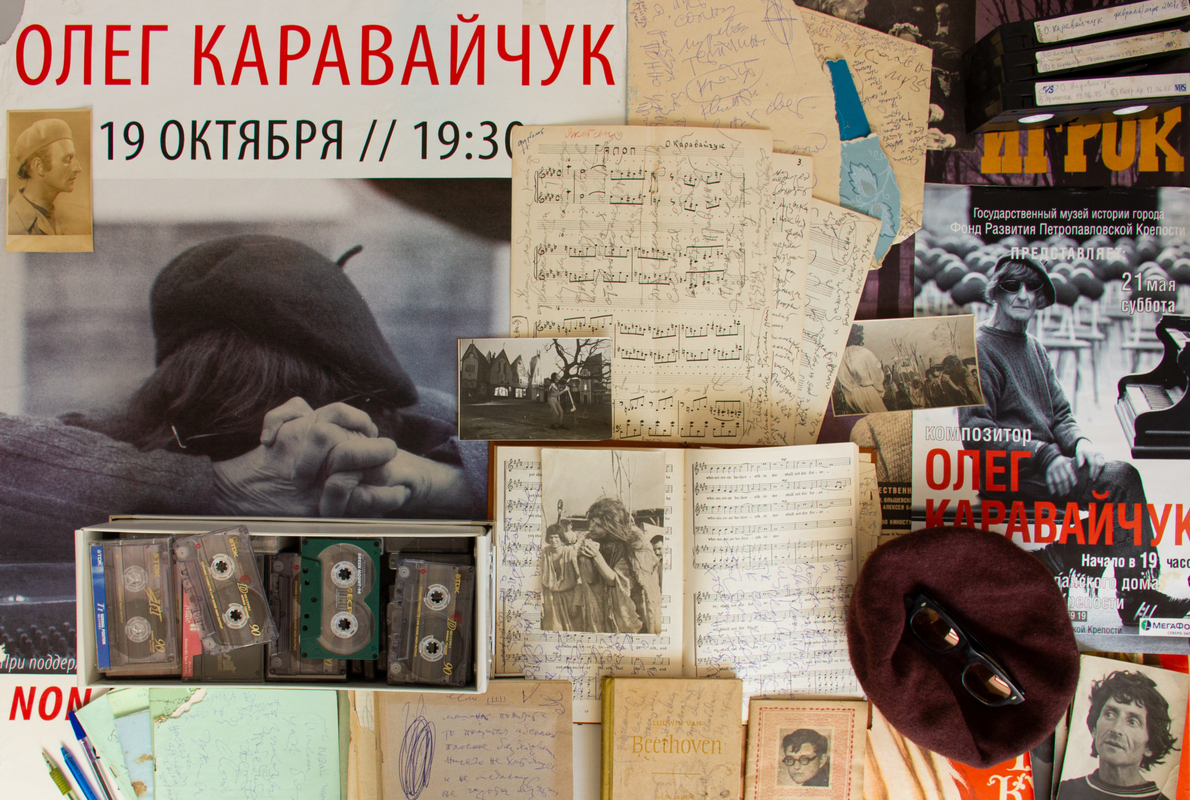Oleg Karavaichuk Archive
Oleg Karavaichuk was a Soviet and Russian composer, master of improvisation, and pianist. He was a true personality, around whom legends grew up thanks to both his extravagant behavior and his hermit‑like existence. This collection of documents reveals details of Oleg Karavaichuk’s biography and provides the opportunity to research the principles by which he worked.
The Oleg Karavaichuk archive includes analogue and digital documents. The analogue part of the collection incorporates sheet music, ephemera, hand‑written notes and letters, the composer’s personal effects, and photographs. The digital part comprises audio and video documentation of Oleg Karavaichuk’s concerts and a collection of films. The hand‑written sheet music for film scores and the composer’s musings are of great value. The sheet music includes finished works and drafts with versions of compositions. Numerous notebooks contain Karavaichuk’s writings on music. Among the ephemera in the archive are posters, books, and programs for films and theater productions for which Karavaichuk composed the music and also materials relating to public concerts that he gave in the 2000s and 2010s. There are numerous documentary recordings of concerts of that period on DVD, Betacam, and MiniDV. The part of the archive that relates to Oleg Karavaichuk’s work in cinema includes original film scripts, working correspondence, and test shots for his occasional film roles.
Among his personal effects are paintings by his mother Nadezhda Pogorelskaya; clothing, including one of the key artifacts from the composer’s life, the pillowcase he wore on his head during performances in order not to be distracted by the audience; a collection of books and magazines about music and cinema; and sheet music by various composers.
Oleg Karavaichuk
(1927, Kyiv‑2016, St. Petersburg) was a composer, including of music for cinema and theater, a pianist, and a conductor. In 1951, he graduated from the piano class at Leningrad Conservatory, while also studying with Sviatoslav Richter. In 1961, during a performance at Leningrad Concert Hall, he argued with the administration of the Conservatory and became persona non grata in Soviet concert halls for two decades. Until perestroika he was known to the general public only for his film music. Over six decades he wrote the music for 150-200 films (the exact figure is unknown). He worked with Kira Muratova, Ilya Averbakh, Sergei Parajanov, Vasily Shukshin, and Pyotr Todorovsky. After the collapse of the Soviet Union, Karavaichuk was able to perform in public. He often gave concerts at the State Hermitage Museum, the Peter and Paul Fortress, and the Isaak Brodsky Apartment‑Museum in St. Petersburg.
He mostly led a hermit‑like existence, writing music in his apartment on St. Petersburg’s Vasilievsky Island or at his dacha in Komarovo. He was friends with Dmitry Shostakovich, Moisei Vainberg, Sergey Kuryokhin, and Marianna Tsoi.
About the archive compiler
Sergey Chubraev (b. 1972) is a producer of television programs, documentaries, and films and a curator. He compiled the Oleg Karavaichuk archive in the last years of the composer’s life. Garage Archive Collection also includes the Sergey Chubraev archive, which contains materials on the life and work of the composer and musician Sergey Kuryokhin.
- Collections
- Persons
- Keywords
- Type of entry
- Place
- Time span
